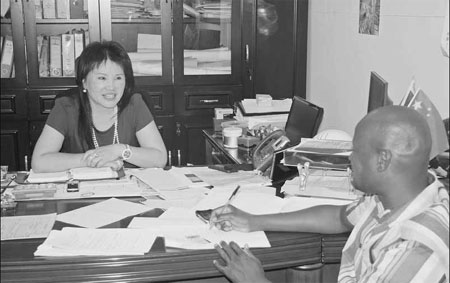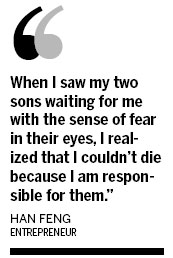Chinese billionaire in Africa
Updated: 2013-04-29 09:11
By Zhao Yanrong (China Daily)
|
|||||||||||
 |
|
Han Fang (left) has changed from being a housewife to becoming a successful entrepreneur in her 22 years in Africa. Provided to China Daily |
Despite wealth, Han Fang never forgets tough early years in Africa.
Watching Han Fang step out of an elevator wearing a warm smile at Mandela Square in Sandton, Johannesburg, it's hard to imagine this single mother in her early 50s is a billionaire and still setting records among the Chinese community in her adopted country.
In 2004, Han opened South Africa's largest wholesale market for Chinese products and last November launched the country's first Chinese website-sa2cn.com.
As president of the Shanghai Chamber of Commerce in South Africa, Han's business interests involve real estate, wholesale warehouses, chain stores, an auction company and a newspaper group.
 |
"I am a layman in the website business, but I know it's the trend of media development," she says. She established African Times in 2006, one of three major Chinese newspapers in South Africa, to give the Chinese community a voice and provide information that could build business cooperation between China and South Africa.
"Real estate is still the major business that I am dealing in, but the virtual economy will play a big role in the future. I want to know more about this new business through practice," she says.
Han graduated from a Shanghai university in the late 1980s with the same curiosity about the outside world that many of her generation shared.
"At that time, China had just opened up to the world and we saw many people finding success overseas," she says. "We were told that the outside world was like a paradise. A friend back from South Africa showed us a video about the country and pictured a promising future there."
In 1991, despite knowing little about South Africa, the 27-year-old flew to Johannesburg to work as an accountant in her friend's company.
She soon realized those dreams of finding the good life abroad easily were false and that everything was hard work. At her friend's company, the staff ate together and Han was too slow with her chopsticks to get much food.
"I could do nothing but watch. I just didn't know how to grab the food with chopsticks like them," she says.
Things began to look up a year later, when she married a businessman from Taiwan and quit work to become a housewife. The couple had two children and Han was busy, but her husband's business was failing and within three years of their wedding he was broke. Han's husband took his anger out on her, first with a bad attitude that later developed into domestic violence.
In an attempt to save their marriage Han borrowed $50,000 from her parents for a shipment of products from Shanghai, but her husband had no interest in selling them.
Eventually all the money had been spent and the marriage was finished. Han was left lonely and feeling trapped with two young children to support, and turned to a bottle of sleeping pills in an attempt to end her life.
"Three days later I woke up in a hospital," she says. "When I saw my two sons waiting for me with the sense of fear in their eyes, I realized that I couldn't die because I am responsible for them."
After her divorce, life was still tough. She set up a booth at factory gates often in dangerous areas where she was bullied by other Chinese vendors and suffered from terrible sunburn.
A loaf of bread would feed her for a week, but sometimes she didn't even have that.
"As long as I could make money, I would work from dawn to dusk, regardless of the situation," she says.
Those were hard times, but they didn't last. While most Chinese businesspeople operating in South Africa were importing small commodities, Han began to sell Chinese-made scarves and handbags, using her sense of fashion to pick popular styles.
"Mine was the first shop selling scarves and because I was the only retailer for the products and my business was very good," she says.
Han spent hours trailing through Johannesburg's shopping malls checking out the latest luxury brands so she could stay ahead of the fashion curve.
"What the new models were and what the trend was, I kept that all in mind so I would know what direction I should take the business," she says.
Three years later she opened her own store, which she called Gutsy, a reference to her own bravery in the face of enormous personal challenges.
It was designed from the start to develop into a chain store, with an experienced local manager, closed circuit television to prevent thieves and the latest cash registry technology.
"I spent a lot of money to start up the store and fortunately the whole city soon knew about my brand. They accepted it like other high-end local brands," she says.
That was the beginning of a business empire, but Han has never forgotten the hard times she faced and that's made her compassionate towards others in need.
"I believe helping others makes life meaningful," she says. "Only when you've gone through hardship do you know the meaning of helping others."
Han founded a charity called Family Trust in Johannesburg and works with the poverty alleviation office of the Chinese Ministry of Foreign Affairs, supporting students at a high school in Malipo, Yunnan province.
She met some of the students whose education she has helped for the first time last November and was deeply touched by the experience.
"It only costs 1,000 yuan for a student to study and live at school per year, but there are still so many families not able to afford it," she says. "I never thought my money could change so many children's lives. Finally, I did one thing so right."
While she helps others in need, Han is somewhat tough with her own sons. They are studying at college in South Africa but have to pay their own tuition fees and are sometimes teased by other students because of it.
"I understand the value of money from the hard times I experienced and I don't want to spoil them," she says. "It's not like I do charity work outside and am only harsh on them. I hope my sons cherish what they have and as a result make good choices in life."
Related Stories
Xi concludes South Africa trip 2013-03-29 15:48
President Xi concludes South Africa trip 2013-03-29 15:29
Mandarin makes its voice heard in South Africa 2013-03-27 10:14
Mandarin makes its voice heard in South Africa 2013-03-27 00:53
China, South Africa agree to boost ties 2013-03-27 02:48
South Africa Special 2013-03-26 16:41
Today's Top News
Two killed in explosion in France
Premier Li: 'High alert' to remain on bird flu
China to enhance ties with Argentina
China joins rush for Mars
Technology fair eyes innovation
A camper's life traveling the open road
Draft amendment stresses consumer rights
Trade growth to pick up slightly this year
Hot Topics
Lunar probe , China growth forecasts, Emission rules get tougher, China seen through 'colored lens', International board,
Editor's Picks

|

|

|

|

|

|





